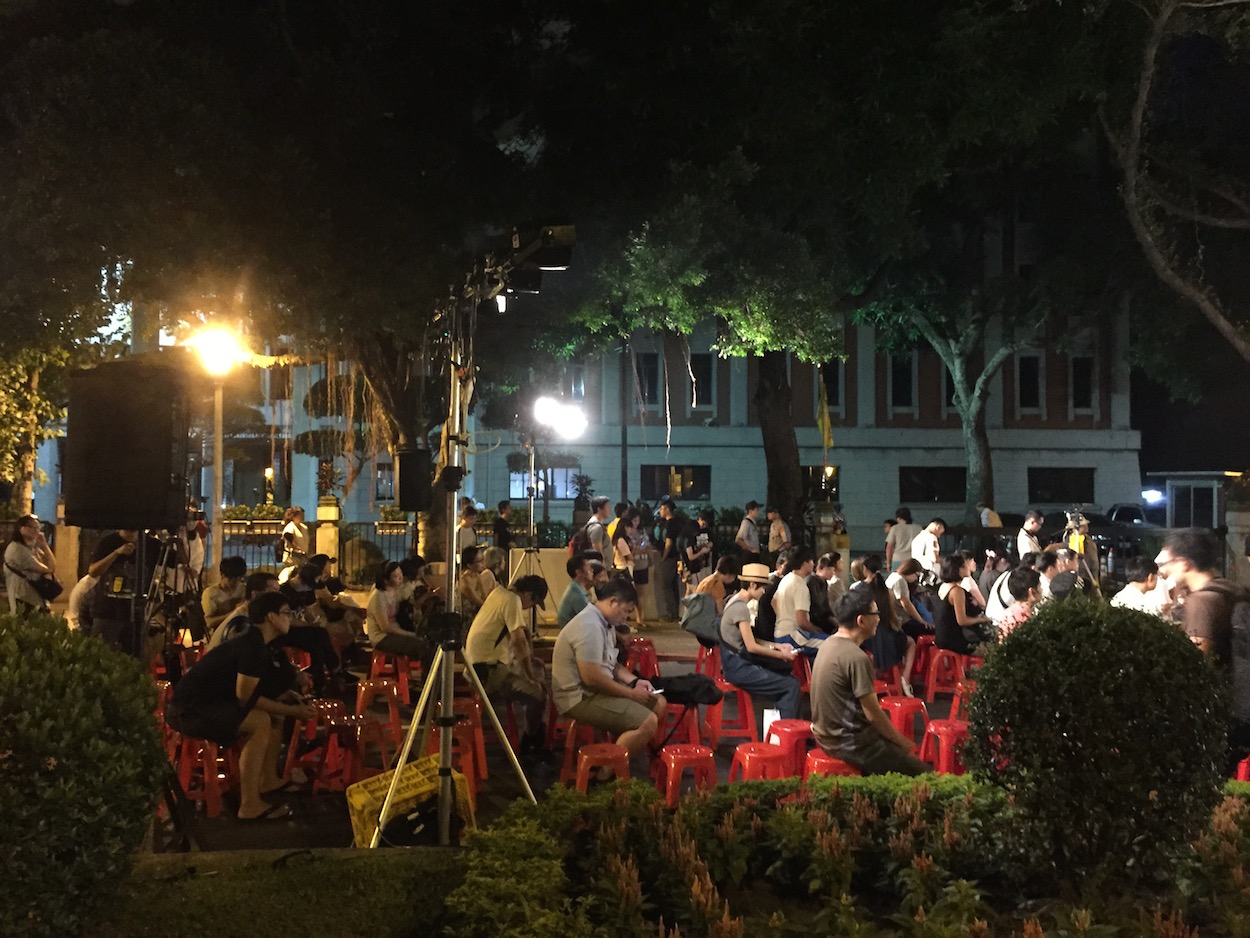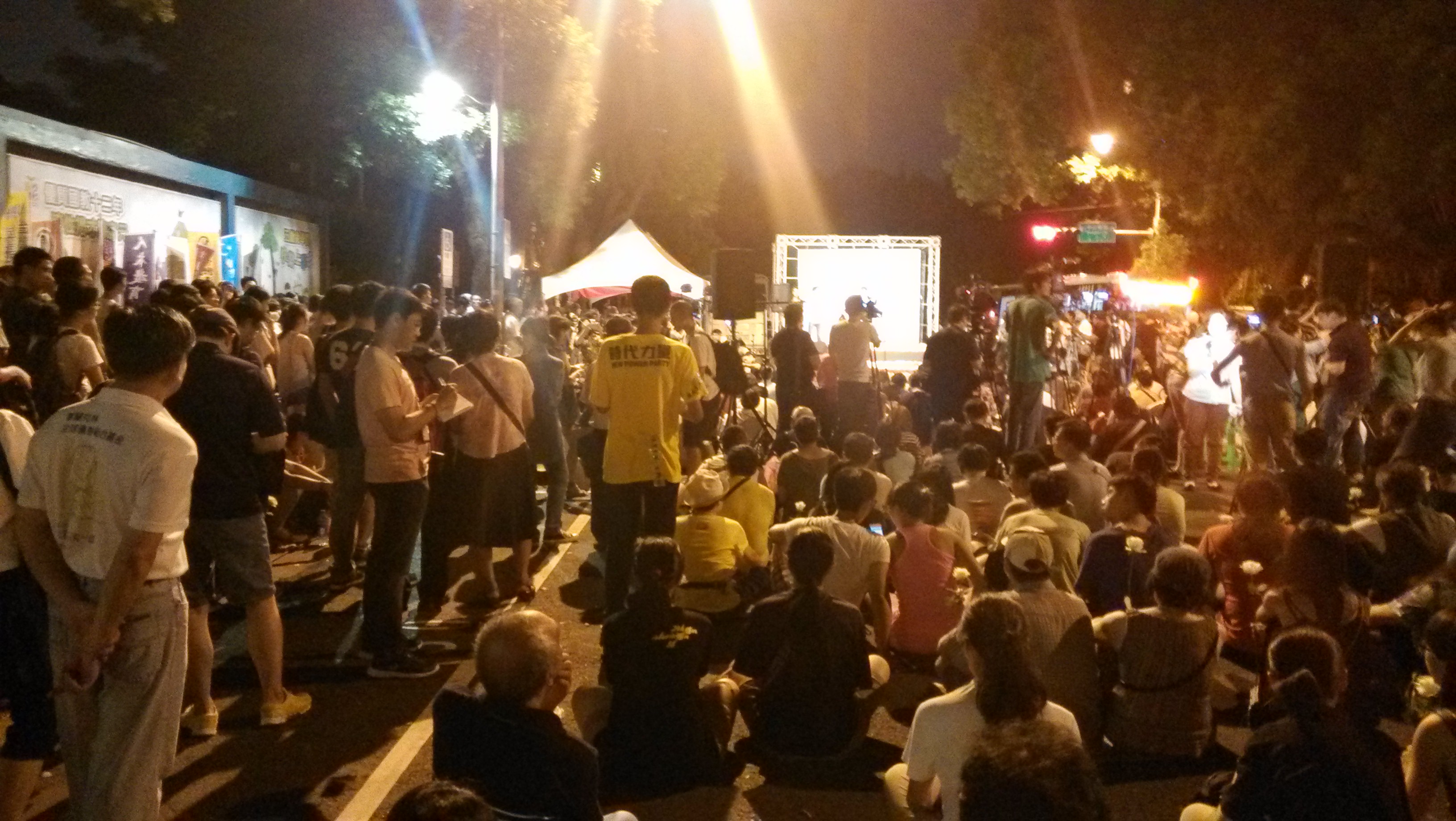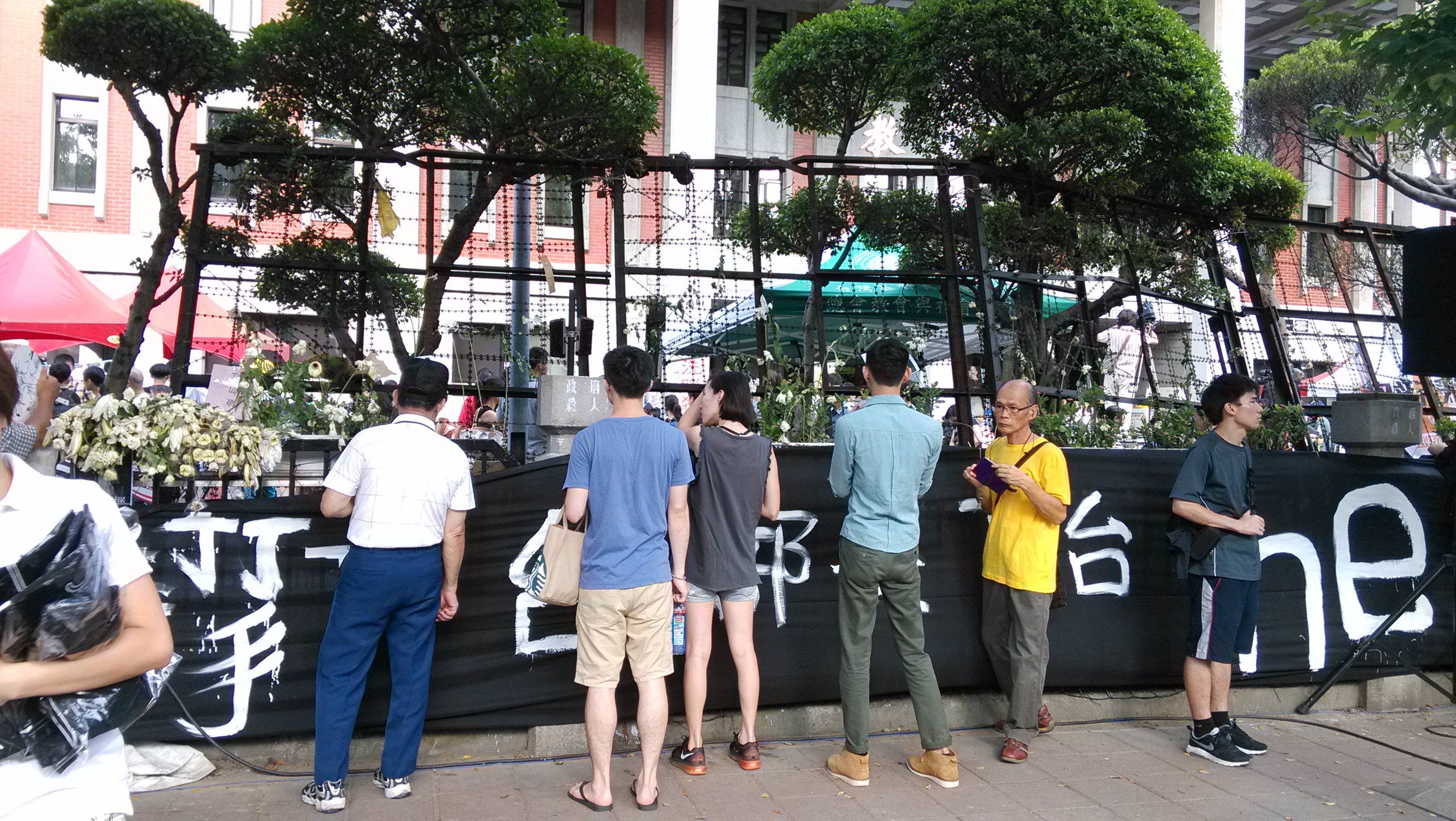by Brian Hioe
語言:
English
Photo credit: Brian Hioe
A COMMEMORATION ceremony for the one year anniversary of the death of student activist Dai Lin was held yesterday outside of the Ministry of Education. Lin killed himself on July 30th of last year through carbon monoxide inhalation after burning a pan of charcoal, which was also the day of his 20th birthday. Lin committed suicide after participating in an attempt to storm the Ministry of Education by high school students a week earlier, on July 23rd, and being arrested. After his arrest, authorities had told Lin that his arrest would always be a permanent mark on his record, preventing him from finding meaningful education or employment in the future. This seems to be what led up to his suicide.
In response to his death, a high school student-led occupation of the parking lot of the Ministry of Education took place that night. The Ministry of Education occupation was at the time the largest outbreak of youth activism since the Sunflower movement, the occupation lasting for about one week before students were forced to withdraw because of an approaching typhoon.
 Commemoration ceremony for the death of Dai Lin outside of the Ministry of Education yesterday. Photo credit: Brian Hioe
Commemoration ceremony for the death of Dai Lin outside of the Ministry of Education yesterday. Photo credit: Brian Hioe
One year after Lin’s death, many of the issues of textbook reform in Taiwan remain unsettled. The issue at hand which prompted the occupation was that planned textbook reforms for high school history textbooks would have instilled a China-centric education, stressing Taiwan’s connection to China back to ancient history, downplaying influence from western or Japanese colonialism, and downplaying the crimes of the KMT during the authoritarian period. The textbook, which were drafted under the Ma administration, would have replaced a more Taiwan-centric textbook dating from the Chen Shui-Bian administration.
After the end of the occupation, the Ministry of Education agreed to allow high schools to choose whether to use older textbooks or newer textbooks, though the full demand of rescinding new textbooks entirely was not met. It was later announced that high school students would be allowed to participate in the Curriculum Guidelines Evaluation Committee to draft new textbooks to be implemented 2018. Nevertheless, one year later, many of the demands of student occupiers have not been met.
 Photo credit: Brian Hioe
Photo credit: Brian Hioe
Despite the change in government under the Tsai administration, initiatives to allow high school students greater say in their education have in recent weeks run aground. At the time of the Ministry of Education occupation, which occurred before Tsai Ing-Wen was elected president in January 2016 presidential elections, Tsai would herself pay a late night visit to the occupation site in order to play up her support for youth movements in Taiwan—and to try and garner more of the youth vote for her 2016 presidential run. But following Tsai’s victory, it remains for textbook reform to be brought to fruition. Namely, plans to allow students more involvement in the history curriculum they are taught continue to be mired in issues, as a result of which there have been calls for delaying planned curriculum changes.
In recent meetings over the last few months, it has been debated between Ministry of Education officials and high school and college students as to how many students should be Curriculum Guidelines Evaluation Committee, what the age qualification of students allowed to participate should be, the ethnic and gender ratio of students allowed to sit on the committee, and other issues. Student nominees to the Curriculum Guidelines Evaluation Committee also need to be approved by the Executive Yuan and Legislative Yuan. There has been similar controversy over qualifications for parents allowed on the committee. But a previous round of voting to elect student representatives ran aground, with students unable to decide representatives and turning over authority back to the Ministry of Education,it seems because in part because students were unhappy with the process for voting for student representatives. A set of 22 student representatives was later decided in late July.
 Occupation encampment outside the Ministry of Education last year. Photo credit: Brian Hioe
Occupation encampment outside the Ministry of Education last year. Photo credit: Brian Hioe
Unsurprisingly, seeing as student representatives need to be vetted by the Executive Yuan and Legislative Yuan, pan-Blue political actors have taken issue with the Tsai administration’s choice of education officials and its allowing student representatives to sit on the Curriculum Guidelines Evaluation Committee. Thus, despite that the Tsai administration is currently power as a DPP presidency and that legislature is controlled by the DPP, the KMT persists with its efforts to instill a China-centric education and one which downplays its past crimes during the authoritarian period.
As such, one year after Dai Lin’s suicide and the Ministry of Education occupation, many of the issues of history textbooks in Taiwan remain to be settled. There remain those—even from the pan-Green camp—have criticized the Tsai administration for allowing students to sit on the committee to begin with. Education about the true and correct historical facts should be left to the experts, they claim—never mind that the study of history is always an act of interpretation of historical facts and insofar as there is never one, unbiased, nonpolitical, and purely objective version of narrating history. Approaching the historical truth thus requires critical inquiry as to the ideological biases of the history one is being taught. After all, any “official history” necessarily excludes the voices of many. Or, as the truism goes, “History is written by the victors.”
 Photo credit: Brian Hioe
Photo credit: Brian Hioe
But high school students seeking to have a say in the version of history they are taught is a sign hat students are not content merely to be the passive recipients of the education that adults tell them. In this, they are demonstrating the critical thinking skills necessary for seeking the true facts of history. More broadly, young people in Taiwan, through the past several years of political mobilization, are demonstrating that they are not content to be a passive, unmotivated “strawberry generation”. And one year after Dai Lin’s death and the beginning of the Ministry of Education occupation, this should be what we remember.

